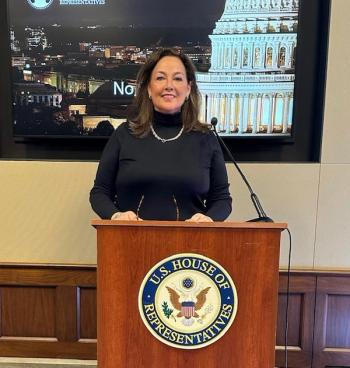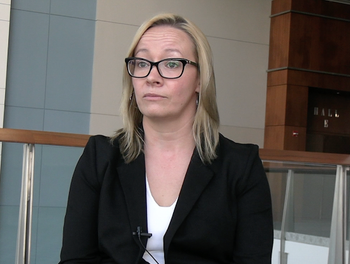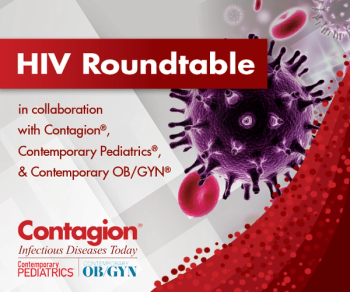
Part 2 with James F Cummings, MD, as he discusses the need for a stronger response to emerging variants, the importance of protecting high-risk populations, and the potential to reduce vaccine hesitancy through easier administration.

Part 2 with James F Cummings, MD, as he discusses the need for a stronger response to emerging variants, the importance of protecting high-risk populations, and the potential to reduce vaccine hesitancy through easier administration.

Part 1 of James F Cummings, MD interview, discusses the trial's goals and highlights the vaccine's potential to generate mucosal immunity, its logistical advantages and ease of administration.

Jennifer Quinn, head of Global Value & Access, Debiopharm, offers insights on pull incentives and how they look to get more antibiotics to market.

Tina Tan, MD, FAAP, FIDSA, FPIDS underscores the importance of education and global collaboration in antimicrobial stewardship to tackle the escalating threat of AMR, and her takeaways from the UN General Assembly High-Level Meeting on Antimicrobial Resistance.

Maryann Webb’s harrowing, personal experience with C diff, along with her professional work with federal agencies has prepared her for a life in advocacy with the Peggy Lillis Foundation. She wants to see the fecal microbiota transplant become more accessible and is working with Congress to make the infection a notifiable infectious disease.

Continuous antibiotic infusions show positive results and may improve outcomes for patients with severe sepsis.

Ammara Mushtaq, MD, discusses the underrepresentation of different races during the pandemic, but also the newer efforts to include and represent these communities in smaller, local studies.

Katrine Wallace, PhD, and Eric John Burnett, MD, discuss the distinctions between them and strategies to understand better the information people are consuming.

Uzma Syed, MD, DO discussed how various factors increase women’s susceptibility to AMR, the importance of policies, and the need for culturally specific education and advocacy to improve health outcomes.

The International Society for Infectious Diseases (ISID) ProMED surveillance system is a way for clinicians and interested ID stakeholders to be aware of local outbreaks and follow-up in response to get more information on them.

At the World AMR Congress, Yann Ferris discussed how leveraging partnerships enhances the fight against antimicrobial resistance.

Ami Patel, PhD, provides insights on both technologies and how her research center, the Wistar Institute, is involved in DNA vaccine and monoclonal antibody research.

The benefits, challenges, and prospects of wastewater data in enhancing public health strategies against AMR.

Syra Madad, DHSC, MSc, MCP, CHEP, outlines early surveillance systems and diagnostic innovations for enhancing pandemic management and response.

Debra Goff, PharmD, discusses her advocacy around this topic and bringing the stewardship message to dentists about how antibiotic prescribing practices have changed and getting them to recalibrate their thinking and actions in their field.

James Graham, CEO discussed the company's progress in developing a new antibiotic for sepsis and diabetic foot ulcers.

Britton Strickland, MD discusses innovations in microbiome research and their impact on antimicrobial resistance.

Bala Subramanian, PhD, highlights how the novel antibiotic BWC0977, with its dual intravenous and oral formulation, is poised to transform the fight against antimicrobial resistance.

Jennifer Ronholm, PhD, discusses the novel concept of microbiome protection to create healthier animals and reduce antimicrobial usage.

Akhila Kosaraju, MD, addresses overcoming key challenges in antibiotic development using AI, a nonprofit model, and supportive policies.

Amanda Jezek, of the Infectious Diseases Society of America (IDSA), offers some insight on the prospective bill in Congress, as well as other AMR initiatives the organization is involved in.

After Diane Shader Smith lost her daughter, Mallory, to a multidrug resistant infection, she turned her personal tragedy into a mission designed to inform people about antimicrobial resistance (AMR), and have the public coalesce around this expanding medical issue.

In this episode, clinicians discuss challenges associated with these topics and offer management insights on them.

In the second part of our interview with Christian Lillis, cofounder and CEO of the Peggy Lillis Foundation, he discusses what the passage of the Peggy Lillis Clostridioides difficile Inclusion Act would do for reporting of the infection as well as the potential ancillary effects around antibiotic development and antimicrobial resistance.

In our latest roundtable series, we cover different aspects of HIV care. In this series, clinicians discuss diagnosis, therapies such as long-acting injectables, treating patients with multidrug resistance and more.

In the current state of the mpox outbreak, individuals with advanced HIV face a higher risk of severe illness, making vaccination and targeted public health measures essential.

Mitch Wolfe, MD, former Chief Medical Officer of CDC, offers some insights on mpox including the benefits of declaring a global emergency, disease transmission, and considerations for both the US public and clinicians.

Scott Bertani, who is the director of Advocacy of the National Coalition for LGBTQ Health, discusses what the new mpox health declarations mean to the US, which groups are high risk, and information about the vaccine to prevent the disease.

The impact of including patients with advanced disease and the role of comprehensive care in the PALM 007 clinical trial, which evaluated the antiviral tecovirimat for treating monkeypox in the Democratic Republic of the Congo.

In part 2 of this interview with Deborah Birx, MD, she highlights that ActivePure Technology provides a continuous decontamination solution that operates independently of manual intervention to reduce HAIs.